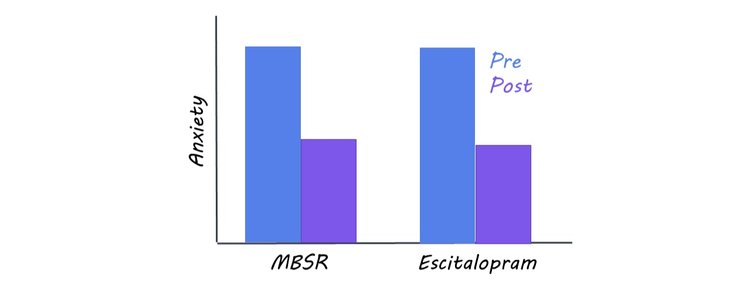Posts Tagged ‘mbsr’
8‑week Mindfulness-Based Stress Reduction (MBSR) course found to be as effective as Lexapro (escitalopram) to treat adults with anxiety disorders, and with far fewer side effects
Anxiety is the most common psychiatric disorder, with over 301 million ?people affected around the world. Whether extreme anxiety arises in social situations, is triggered by a particular phobia, or manifests as a general unease in the world, it can severely affect people’s everyday functioning and lead to high levels of distress. Luckily, there are…
Read MoreOn Stress, Yoga Meditation, and The Evolution Revolution
In the Tale of Two Cities, Charles Dickens wrote: “It was the best of times, it was the worst of times. It was the age of wisdom, it was the age of foolishness…. It was the season of light, it was the season of darkness. It was the spring of hope, it was the winter of…
Read MoreStudy finds a key ingredient in mindfulness training: Acceptance (not acquiescence)
Life can be stressful. Whether it’s the stress that comes with having too much work to do in too little time, fulfilling caregiving obligations, or dealing with a major illness or setback, sometimes it can be hard to cope. In response to stress, many people today are turning to meditation or mindfulness apps (myself included). But…
Read MoreStudy: Mindfulness-based Stress Reduction (MBSR) and Cognitive Behavioral Therapy (CBT) beat usual care for chronic back pain
Study finds mindfulness meditation offers relief for low-back pain (NIH release): “Mindfulness based stress reduction (MBSR) and cognitive-behavioral therapy (CBT) may prove more effective than usual treatment in alleviating chronic low-back pain, according to
Read MoreDoes mindfulness meditation work? (Hint: First, define “work”)
How convincing is the science driving the popularity of mindfulness meditation? Brown University researcher has some surprising answers (tricycle): “Given the widespread belief that meditation practice is scientifically certified to be good for just about everything, the results of a recent major analysis of the research might come as some surprise… (Question) As a scientist and…
Read MoreMeditation can Change the Structure of the Brain
(Editor’s Note: We are pleased to bring you this article by Jason Marsh, thanks to our collaboration with the Greater Good Magazine.) . I consider myself something of a prospective meditator—meaning that a serious meditation practice is always something I’m about to start… next week. So for years, I’ve been making a mental note of…
Read More





